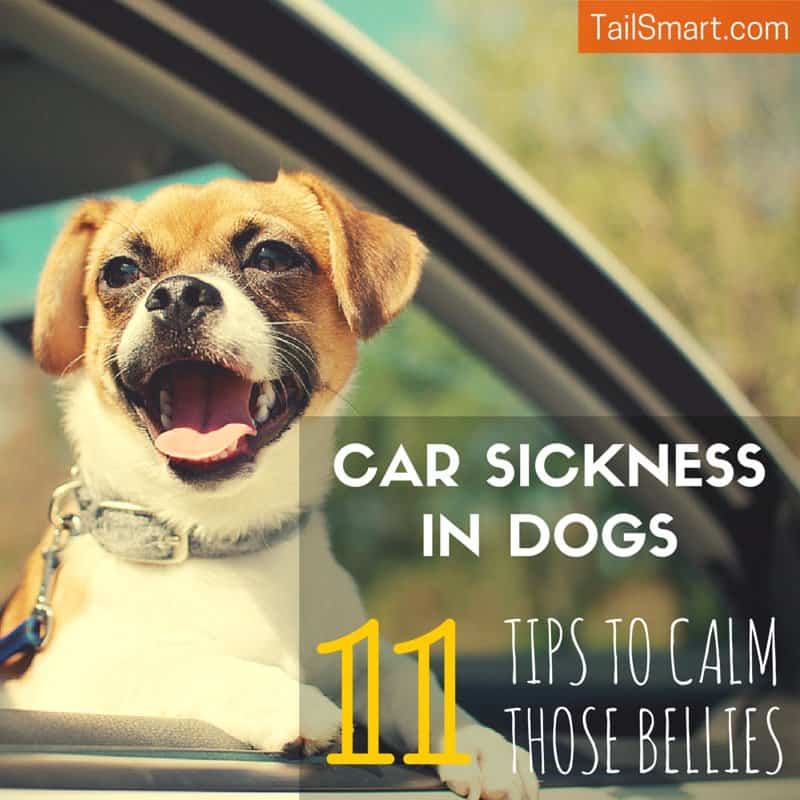
There is no happier sight than a dog with his head out of a car window, smelling the world as it rushes by. However, some dogs are not so lucky. The unlucky few get car sick!
Car sickness is more common in puppies and young dogs than in older dogs. This may be because the structures in the ear that are used for balance are not yet fully developed in pups. Although this means many young dogs will outgrow their car sickness by the time they turn one year old, they may develop a fear of riding in a car. It’s therefore important to treat car sickness promptly and ensure your dog learns to enjoy car rides.
11 Tips to Calm Those Bellies
Signs of motion sickness include inactivity or sometimes restlessness, yawning or panting, whining, excessive drooling, and vomiting.
Fortunately, there are some things you can do to combat car sickness:
- Rule out any health problems. Take your dog to the vet for a check-up to make sure there are no underlying issues.
- Have the dog travel face forward using a canine seat belt. (If you strap him in the front passenger seat, sit him far back or disable the airbag as it can hurt him.)
- Use a pet car seat so he can look out the window, this will make it less likely for him to get car sick (it works the same in car sick humans).
- Open car windows a fraction to equalize the inside and outside air pressure.
- Keep the car cool.
- Some dogs travel best on an empty stomach (no food for 6-8 hours before the trip) while others fare better with a small meal. Experiment until you find the best option for your dog.
- Take regular breaks. Once you know how long your dog can go before getting really sick, you can plan your breaks accordingly.
- Feed your dog a sugary candy just before the trip (not chocolate!), this is known to reduce nausea.
- Your dog may associate car rides with trips to the vet and the stress may be causing him to get car sick. In this case, recondition your dog to associate car rides with good things and eliminate stress.
- Feed your dog ginger. Ginger helps to combat nausea in humans and in dogs and is available in different forms, such as capsules or crystalline form. Most dogs like ginger too, which makes it easy to feed him ginger before undertaking a trip.
- If none of the above tips help and your young dog is not outgrowing car sickness, medication can help. Talk to your veterinarian about your options.
Try to make the car fun and safe
To deal with the negative associations your dog may have developed with car rides as a young pup, you need to do your best to recondition him. To begin with, give your dog a break from car rides for a few weeks. Then when you’re both ready, you can start the process of a happy and fun reintroduction to the car.
Start by just going near the car and simply play with your dog. Create positive associations with the car. Over a few days move the play closer and closer to the car. When your dog is ready, have a play session inside the car while it is stationary and with the doors open. Purchase a special toy that he’ll like that he can only have inside the car.
Then get the dog used to playing near the car while it’s running, go through the same cycle of moving the play closer and closer to the car, but now the car is running. When your dog is ready, have a play inside the car while it is running.
The next step is to close the doors and drive for a very short distance (maybe just down your driveway). Of course, be sure that you take car safety for dogs seriously.
At this stage, it would be helpful if you have a helper to do the driving or to play with the dog as the car is moving. If you’re on your own, make sure the dog is not getting upset. Pullover regularly to play with your dog.
If your dog is now quite happy on these mini-rides, plan a short drive of five to ten minutes away to a place he enjoys going (park, beach, human or canine friends, etc.). Have a play session at the destination then drive back. Have another play at home immediately upon returning to thoroughly cement in his mind that car = fun.
If at any stage your dog is getting anxious or upset, go back to a previous stage. It may sound like a bit of an ordeal, but it generally goes quite quickly, and playing with your dog should be great fun!
Great tips and some of these are appropriate for our feline friends too!
Hi Pawesome, thanks for dropping by! You’re absolutely right.